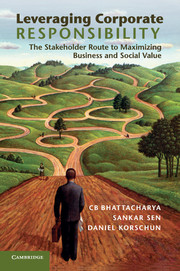One - The long and winding road to CR value
Published online by Cambridge University Press: 05 June 2012
Summary
Corporate Responsibility (CR) and you
On September 5, 2007, the Buddhist monks of Pakokku, Myanmar joined the citizen protests that erupted in that impoverished country in August of that year. The uprising was triggered by a long-simmering array of discontents ranging from high commodity prices to human rights abuses, including the long-term detention of pro-democracy leader Aung San Suu Kyi. The ruling military government in Myanmar, in power since 1962, took action to quell the protests. A few days after the monks joined the protests, troops fired on protesters in a crackdown that left at least ten people dead by the government's account (opposition groups put the fatalities at around 200). Independent reports suggest that several monks were beaten and killed.
Amid the international outcry over these events, the only company in the US to issue a public statement was Chevron (see Exhibit 1.1). Why? Because Chevron is the only American company doing business in Myanmar, in the face of a systematic, comprehensive and sustained US trade boycott of that nation. Chevron acquired a minority stake in Unocal (a US conglomerate) that operates the Yadana Valley Project, which produces 650 million cubic feet per day of natural gas for export to neighboring Thailand. A loophole in US sanctions has allowed Chevron to operate in Myanmar.
- Type
- Chapter
- Information
- Leveraging Corporate ResponsibilityThe Stakeholder Route to Maximizing Business and Social Value, pp. 1 - 24Publisher: Cambridge University PressPrint publication year: 2011

